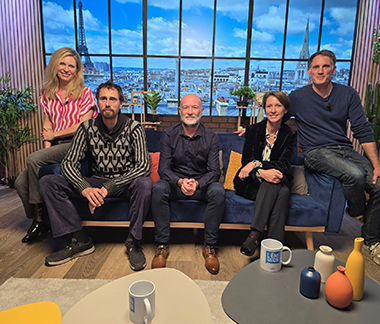Article by Voxlog: " Île-de-France region GEIQ Impact helps people back into the logistics and transport industry".
Could you tell us about the Île-de-France region GEIQ Impact - [Employer Grouping for Insertion and Qualification] ?
Bruno Savary de Beauregard: The Île-de-France region GEIQ Impact is a non-profit association run and managed by its member companies. Its aim is to offer people in need of professional integration contracts of 6 months or more, depending on the course, in the world of transport and logistics. We recruit and place employees on professionalisation contracts with our members. Our role also involves organising the employees' training pathway, so they benefit from double tutoring by the member company and by the GEIQ, and from socio-professional support also provided by our organisation. Finally, we also cover the costs of the training.
How does this support work ?
Eric Nanti: The contract we have put in place gives them six months' experience and a professional qualification. The ultimate aim is to be able to support them until they sign a permanent contract. The integration criteria for trainees are quite varied. They range from young people aged under 26 with no qualifications to refugees, people with RQTH (recognised status for disabled workers), ex-prisoners and people on RSA (earned income supplement).
Bruno Savary de Beauregard: We work with groups of 10 to 15 people, so that both GEIQ managers and warehouse teams can provide personalised support. One and the same customer can accommodate a single intake at one or more of its warehouses. This group can also be split between several members.
What are the advantages for GEIQ member companies ?
Eric Nanti: The GEIQ is proving to be an effective solution to labour shortages in the logistics and transport sector. Our members include Stef, Fnac Darty and Transgourmet...
Bruno Savary de Beauregard: We train order pickers, forklift drivers, delivery drivers, etc. It's up to the GEIQ to find the training that meets the needs of companies. Our catalogue is not restrictive, so there is a huge potential pool of skills and talent available to companies.
How do you support your work-study students during their training ?
Bruno Savary de Beauregard: Our aim is to support our work-study students as closely as possible to what's happening in the field. They have a dedicated induction day where they meet the company and their tutors. We visit the site several times a week to make sure that everything is going well, that the assignments have been understood, that the working hours are being respected and that the learning conditions are good. We also try to remove the social obstacles to professional reintegration, whether in terms of housing or administrative procedures... To do this, we work actively with the region's network of associations.
Eric Nanti: It's important for us to get to know them well, because each of them has their own personal issues. We have to be close to them while managing them. Our ambition is to (re)inspire them to take training courses, get a permanent contract and progress. Our role is to give meaning to their actions, to make them understand that the company is counting on them. This involves some fairly basic but essential concepts: being on time, letting people know if you're going to be late, fitting in with a group, and so on. This requires both high standards and benevolence, but the results are quite satisfactory for the teams, the tutors, the people recruited and the employers. We have very few failures.
Bruno Savary de Beauregard: We charge for a work and/or productivity service provided to the company. Our approach is therefore one of human management, while at the same time enforcing commitments aimed at delivering efficiency to our members.






